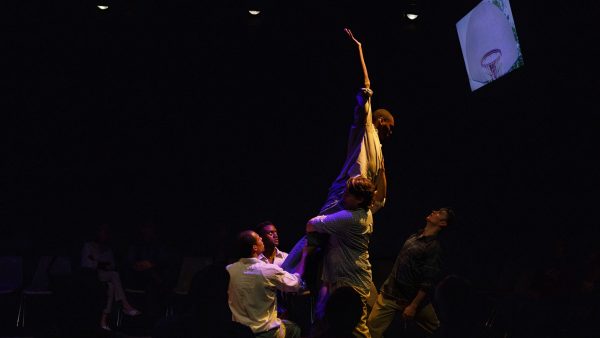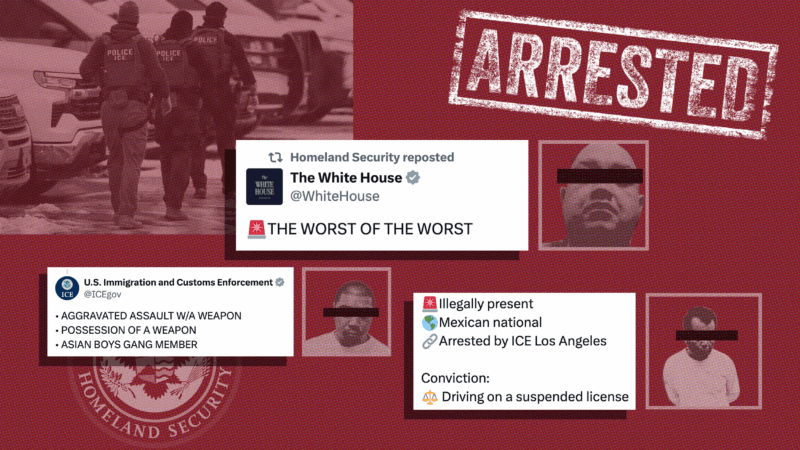A New Play Explores Race Through A 1951 Birmingham Basketball Court
Steven Bond Jr., Dylan Guy Davis, Edwin Brown III (in the air), James Holloway, Adrian Baidoo in "Separate and Equal"
When Seth Panitch visited the Birmingham Civil Rights Institute, he was struck by a legal code book that listed rules of segregation.
“What stood out to me was this one sequence when they talked about [black and white] kids, children, and how they couldn’t play games together,” says Panitch. “They were so specific.”
Panitch says in the case of basketball, it was too costly for Alabama to build separate basketball courts. So authorities would assign certain times that blacks and whites could use the courts.
Panitch, who is the head of the University of Alabama’s acting programs, had a thought. What if black and white teens stumbled onto each other on the court? And could that be a prism through which to discuss race?
That was the spark for the new play “Separate and Equal.” Panitch wrote and directed the play which premiered this month off-Broadway in New York. The play centers on a hypothetical basketball game between three white and three black teens in 1951 Birmingham — a game that would have been illegal.
Panitch used the Birmingham Civil Rights Institute’s oral history collection to inform his work. He says reading transcripts he noted how parents trained their children to fall into their expected roles under segregation.
“One of the main themes of the play is how we keep expecting the youth to sort our problems out. But the problem is that we’ve trained them so intently on our own failures that it’s difficult to see any other possibility in the future,” says Panitch.
In the theater, the audience surrounds the stage as if they were watching a real basketball game.
“They might get sweated on cause they’re pretty close to the action,” says Panitch.
The actors’ movements are choreographed, a combination of basketball and modern dance, and set to an original score that transitions from rock and to jazz. Panitch says he considered staging a real basketball game but it was problematic. A misthrown ball could go into the audience. He also couldn’t control the score which is a key plot point.
Panitch says symbolic is better.
“When you stylize something it really frees up the audience’s imagination for them to read the play in perhaps a different way than they would if it was literal,” says Panitch.
“Separate and Equal” runs in New York through September 30th, but it had a short preview in Tuscaloosa in August. Panitch says audiences in both cities would linger and discuss the show. In Alabama, the history was very real.
“Many of the older people in my audience in Alabama would come up and talk to me afterwards and say ‘That was my uncle.’ Or ‘that was my grandfather’ or ‘I see my family in that,’” says Panitch.
He says the New York audience may have had more distance from the history, but they are more polarized.
“In some respects, they do feel that it’s factual to them as a modern expression of race,” says Panitch.
He says there are no plans to bring the play to Birmingham, where it is set, but he hopes it will happen.
“I think that would be very important to do it where it was researched…and near so many of those milestones in the struggle,” says Panitch.
Parents, are you sure your kid’s car seat is installed right? Here’s how to know
In this visual guide, certified car seat experts walk through common installation mistakes and how to fix them. Learn what a secure car seat base and a tightly fastened tether look like and more.
Trump announces ‘major combat operations’ in Iran
Israel and the U.S. have launched strikes against Iran, with explosions reported in Tehran and air raid sirens sounding across Israel.
Trump says he is ‘not happy’ with the Iran nuclear talks but indicates he’ll give them more time
U.S. President Donald Trump said Friday he's "not happy" with the latest talks over Iran's nuclear program but indicated he would give negotiators more time to reach a deal to avert another war in the Middle East.
Bill Clinton says he ‘did nothing wrong’ with Epstein as he faced grilling over their relationship
Former President Bill Clinton told members of Congress on Friday that he "did nothing wrong" in his relationship with Jeffrey Epstein and saw no signs of Epstein's sexual abuse as he faced hours of grilling from lawmakers over his connections to the disgraced financier from more than two decades ago.
How the federal government is painting immigrants as criminals on social media
Experts say this kind of media campaign is unprecedented and paints a distorted picture of immigrants and crime
Pentagon puts Scouts ‘on notice’ over DEI and girl-centered policies
After threatening to sever ties with the organization formerly known as the Boy Scouts, Defense Secretary Hegseth announced a 6-month reprieve








